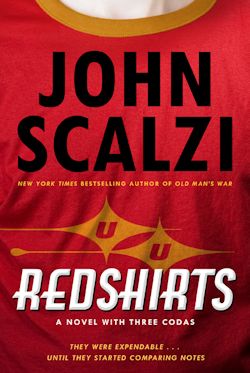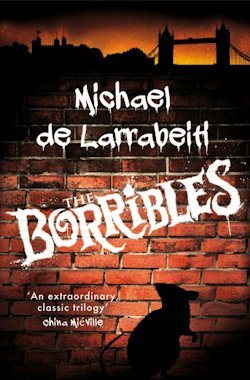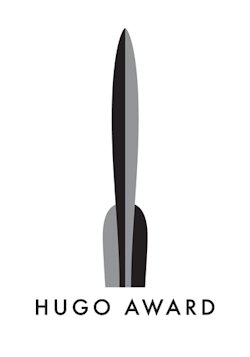Welcome back to the British Genre Fiction Focus, Tor.com’s regular round-up of book news from the United Kingdom’s thriving speculative fiction industry.
This week in the business, the opening of the nominations process for the 2014 Hugo Awards was the cause of a debate between Adam Roberts and John Scalzi: a veritable war of the words between Britain and America.
Later on, news of Kim Curran’s next novel, not to mention its non-traditional path to publication, and in this week’s links, Gollancz have been talking 2014, I have all the details you need to keep track of the second Twitter Fiction Festival, and at long blasted last, The Borribles are back.
How You Ruined the Hugos
A new year can mean many things, but let’s face it: it’s basically punctuation; a paragraph break which gives authors an opportunity to pause for thought—and by authors here I mean mere mundies like you and me, for we are all authors of our own destiny, aren’t we?
What with the day-job and all it pains me to say it, but poor punctuation is an ever more prevalent problem, and given this week’s battle of the big-shot bloggers, the period between 2013 and 2014 seems to have been treated more like a comma than any sort of full stop.
What happened was simple enough, never mind the ruckus that resulted: the nomination process for the 2014 Hugo Awards began. The Hugos are of course public prizes—insofar as Worldcon members can be seen to represent said—and as such, they’re open to funny business, for instance “self-pimpage.”
Speaking on Sibilant Fricative, Adam Roberts, the author of Adam Robots—which is eligible for Best Collection, incidentally, and whose new novel, Twenty Trillion Leagues Under the Sea, is released this week—put the problem as follows:
Award season is also the start of the “for your consideration” blogposts, in which writers large and small draw potential voters’ attention to all the things they have published during the relevant period and try, with varying degrees of success, to find endearing or witty ways of making VOTE FOR QUIMBY sound less self-serving than it actually is. I used to find all that blather annoying and vulgar. Nowadays I find it more directly loathly, because it seems to me directly and negatively distorting of the award shortlists that follow. Like cigarette advertising, people wouldn’t do it if it didn’t work; and like cigarette advertising (though with less specifically health-harmful consequences for social morbidity) it shouldnta oughta be alloweda work. Awards should reward the best books, stories and films, not the authors with the biggest megaphones or largest body of loyal minions.
Roberts went on to identify what he sees as the primary drawbacks of genre awards:
SF Awards have, as a rule, much to recommend them; but they have two big flaws. One is the loyalty implied in the descriptor “fan”, in which a shitty work by an author of whom (or a shitty episode of a show of which) one is a fan gets your vote because that’s what being a fan means—it means sticking with your team. Ditto: voting for an author rather than voting for a text. Here the niceness or popularity of a given author may overshadow the merits of the books said author has actually produced.
[…]
The second flaw is the way people often vote for what is shiny and directly in front of their faces, not necessarily because they are idiots, but perhaps because their time is short, they want to be involved in the process but don’t want to bother researching the full gamut of possibles, because they don’t care all that much, or a hundred other explanations. It means that works can get onto shortlists not because they are necessarily very good, but merely because that have been dangled directly in front of people, by (a) expensive marketing campaigns, hype, or being on the gogglebox, or (b) the aggressive self-promotion of energetic authors strenuously seeking to maximize their online profile.
We’ve heard it all before, of course, but in the midst of all this Englishness, Roberts does make an imperative point: surely awards should go to the best books rather than the books whose authors have made the most noise. I sincerely doubt anyone here would disagree.
But is that what’s actually happening?

John Scalzi doesn’t think so, and as a Hugo Award-winner himself, he seems pretty pissed:
Are the Hugo slots (and wins) going only to inveterate self-promoters with piles of slavering minions? Meh. The last five Best Novel winners are me, Jo Walton, Connie Willis, China Mieville and Paolo Bacigalupi. Connie and China are hardly online at all; Jo and Paolo haven’t, as far as I can tell, made much of an effort to self-promote their works.
[…]
The best you can say looking at the recent list is that Hugo Awards for Best Novels tend to go to popular writers who have a number of previous nominations or wins, and, well. Yeah. Welcome to the Hugos. But this does not imply that the voting process was unduly skewed, either in the nominating or voting process, by writers informing the public about their eligible work, or that fans, however one wants to slice and dice the term, rush to value affiliation with an author to the exclusion of critical consideration of work—if not for specific titles, then over the universe of their nomination choices.
It might mean that the nominators of the Hugos in aggregate have reading tastes that differ from Roberts’ (or any other observer of the award). But, you know. That’s life. I admit to getting a little tetchy about what I think is a lazy characterization of science fiction fandom by people who wish they read different things and voted different ways than they do. It’s easier to think of “fandom” as a bunch of uncritical, affiliation-affirming team boosters than, say, reasonably intelligent people who decide, with adequate critical discernment, to like what they like, and what they like is different than what you like. I think it’s excellent and laudable to encourage (and, sure, occasionally hector) people to read more widely and more deeply in the genre, and to be open to new and manifestly different writers, and to nominate their work for the genre’s prominent awards. You can do that without also implying fandom is the literary equivalent of football hooligans.
Quite right.
In Roberts’ defence: Scalzi mighn’t have met them, but some fans are exactly that fanatical… though I have my doubts that many of these die-hards are disposed to attend conventions in honour of the genre overall rather than the author of their choice.
Furthermore, Roberts wasn’t talking specifically about the Hugos, whereas the evidence Scalzi dispensed in his rebuttal applies to those awards only—and only one category of them, at that.
It’s hard to deny that there is a problem with the Hugos, among other awards, but the truth of it, I think, lies somewhere between these extremes. Be that as it may, this isn’t a debate we’ll settle in a day, or a sentence, to return to my earlier metaphor, that shows the slightest signs of ending—at least not until the nominations process is altered. Indeed, I expect many and various critics and commentators to append their own semi-colons and clauses to said sentence in the weeks and months to come.
I’ll keep you posted, I promise.
Days of Glaze

Amateur philosopher and established author Kim Curran took some by surprise last week with the announcement of her next novel. It’s not Delete, the grand finale of the Shifter series. Rather, it’s a brand new young adult science fiction social media something, name of Glaze:
Petri Quinn is counting down the days till she turns 16 and can get on Glaze—the ultimate social network that is bringing the whole world together into one global family. But when a peaceful government protest turns into a full-blown riot with Petri shouldering the blame, she’s handed a ban. Her life is over before it’s even started.
Desperate to be a part of the hooked-up society, Petri finds an underground hacker group and gets a black market chip fitted. But this chip has a problem: it has no filter and no off switch. Petri can see everything happening on Glaze, all the time. Including things she was never meant to see.
As her life is plunged into danger, Petri is faced with a choice. Join Glaze… or destroy it.
On her blog, Curran talked about the non-traditional tack she’s taking with this one vis-à-vis its route to release. Evidently a great deal of Glaze was written some time ago—just after Shift went into submission. Casting her eye over the manuscript when work on the Shifter trilogy was finished, the author found that she’d unwittingly written something particularly prescient:
A lot of the stuff I had been predicting had come to pass. The social network in Glaze is accessed via a chip in the brain that creates an optical overlay—and I’d written it before I’d heard a thing about Google Glass. The first chapter features a riot in London—and it was written long before the London riots.
In re-working the book, I realised I was going to have to move fast with Glaze if it was going to stay topical.
To that end, Curran came to the conclusion that she would self-publish her new book. Thus, the paperback and digital edition will be coming from Amazon White Glove; a programme open to agented authors only, apparently.
More interesting, methinks, is that a limited edition of Glaze will be produced too, and it’s being handled by British Genre Fiction Focus favourite Jurassic London: a not-for-profit small press who do, to be sure, know how to produce a truly beautiful book. Something they full well intend to do, as Jared Shurin notes in a post on the publishers’ brand new blog:
Glaze will be our first foray into novel-length original fiction, and I still believe this will be the exception for us, not the rule. But I strongly believe that the innovation and excitement in genre fiction is coming from writers like Kim, and I am delighted that we have the opportunity to work with her to bring her vision to life.
Our goal is to create a stunning physical edition of Glaze that both supports and showcases its incredible story: a beautiful, exclusive book that does Kim’s work proud.
It’s worth mentioning, as well, that this comes just one month after Jurassic London announced that it plans to publish a new, as-yet-untitled history of science fiction by genre fiction critic Andrew Liptak. It pleases me a great deal to see the small press spreading its wings a bit.
For the Love of Links

- Beginning with The Borribles tomorrow, Tor are rereleasing three of China Mieville’s “very, very favourite books ever” as special digital editions, and of late they launched the cover for the first one.
- Gollancz have discussed their plans for the SF and Fantasy Masterworks series in 2014.
- In addition, they’ve talked about the year in debuts hitting the latest list. And in conclusions. And in continuations.
- Gollancz have also revealed the final cover art for The Boy with the Porcelain Blade by Den Patrick: a book I can’t wait to get my hands on, having perused the author’s wicked War Manuals over the winter.
- Vintage are launching a campaign called Shelf Help shortly, which fun with puns purports to provide a selection of “literary alternatives” to the self-help books that sell so well.
- Book reviewer Martin Lewis didn’t like Drakenfeld by Mark Charan Newton. Which is fine! To each their own, of course. Markedly more interesting, methinks, is the point he made whilst explaining its failings over on Everything is Nice: “I can like Newton as a person and dislike his work and there needn’t—shouldn’t—be any connection between the two. Much online book blogging has been rendered pointless by the failure to grasp this distinction.” Put that in your post and smoke it.
- Last but not least for the time being, the second Twitter Fiction Festival will be held on the web—where else?—between the 12th and the 16th of March. Keep track of the hashtag #TwitterFiction for a selection of potentially fascinating 140-character narratives.
Niall Alexander is an extra-curricular English teacher who reads and writes about all things weird and wonderful for The Speculative Scotsman, Strange Horizons, and Tor.com. He’s been known to tweet, twoo.










